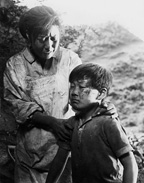Films from South Korea
These works represent South Korean films that depict zainichi. With the cooperation of the Korean Film Archive, we were able to invite South Korean films previously unreleased in Japan.
 Nostalgia
Nostalgia
(“Manghyang”)- SOUTH KOREA / 1966 / Korean / B&W / 35mm / 102 min
Director: Kim Su-yong
Script: Kim Gang-yun
Photography: Jeon Jo-myeong
Art Director: Park Seok-in
Music: Jeong Yun-ju
Cast: Kim Jin-kyu, Seo Seung-hee, Kim Seung-ho, Hwang Jeong-sun, Nam Jeong-im
Production Company: Yun Bang Films
Source: Yun Bang Films, Korean Film Archive
A company president whose business failed and his Japanese wife. They and other zainichi compatriots suffered discrimination in Japanese society, and returned to a North Korea advertised as an earthly paradise. However, what awaited them there was forced labor in the coal mines. The returnees who rebelled against their subhuman treatment in North Korea organized an escape and headed to South Korea. This film is highly realistic, using stock footage of the return to the home country and images of the North Korean flag.
 That is the Sky Over Seoul
That is the Sky Over Seoul
(“Jeogeos-i Seo-ul-ui haneul-ida”)- SOUTH KOREA / 1970 / Korean / Color / 35mm / 95 min
 Director: Kim Su-yong
Director: Kim Su-yong
Script: Lee Sang-hyeon
Photography: Ahn Chang-bok
Art Director: No In-taek
Music: Jeong Yun-ju
Cast: Shin Young-kyun, Kim Hee-gap, Hwang Jeong-sun
Production Company: Hap Dong Films
Source: Hap Dong Films, Korean Film Archive
At his son’s invitation, a South Korean man visits Japan, and meets a woman who manages a Korean restaurant in Tokyo. The woman’s daughter is in charge of the education of second-generation students at a Korean school, but is unable to hold classes due to disruptions by Chongryon activists. Discovering the complexity of life as a zainichi Korean, the man takes action . . .
